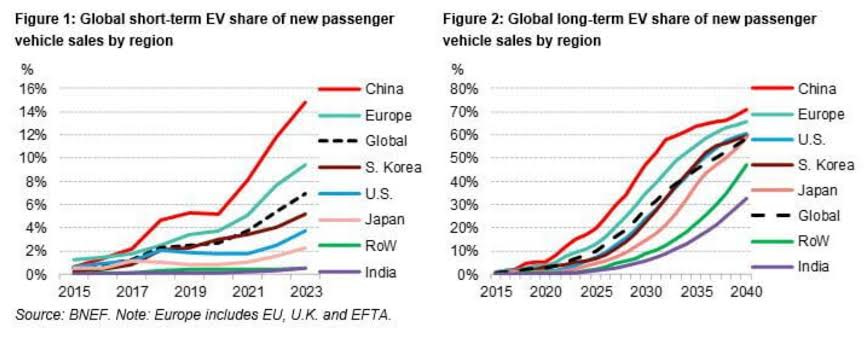🚗 Toyota's Crazy Bet!
Despite increasing adoption of electric vehicles, why is Toyota betting on hydrogen as the next big thing?
We've all been told to "think outside the box" at some time or the other. And while the advice makes sense, it’s not always easy to implement. What usually happens is one person thinks outside the box, and the others simply copy them.
This is exactly what is happening right now. We need quick solutions for climate change and everyone seems to have one answer: forget fossil fuels and switch to electric vehicles. In fact, six major carmakers (including General Motors and Ford) have signed a pact to phase out fossil-fuel based cars by 2040 at the COP26 conference.
While that is a great idea, could there be another solution to the problem?
Toyota's Out-of-the-Box Idea
Imagine if you could drive a car that produced water vapour instead of all the toxic gases. As far fetched as it may seem, this is the future Toyota is betting on.
Toyota is creating a car powered by hydrogen.
One sec: aren’t hydrogen fuel cells (HFCs) all the rage nowadays? Especially with Reliance getting in on the game? Yes. They are. And in fact, Toyota has tried its hands on HFC powered cars (which are battery-powered vehicles, where batteries draw energy from burning hydrogen.)
While HFC-powered cars are eco-friendly, they are not so pocket-friendly. They cost more than twice as much as normal fossil fuel-powered cars.
And this unaffordability makes mass adoption of HFC-cars a pipe dream, unless costs come down. That’s why Toyota is now turning towards hydrogen-powered internal combustion engines.
These will be just like the petrol and diesel-powered cars that we use now.
The Case Against Hydrogen-Powered Cars
Wondering why Hydrogen-Powered Cars aren’t already a big thing?
Lots of reasons for it.
Hydrogen-powered engines are large and clunky. They take up a lot of space. In an era where people drool after sleek and compact cars, who would want to buy those?
One can still compromise on the looks, but would you bet on safety? Safety concerns are the real deal-breakers for hydrogen-powered cars. Refuelling hydrogen cars is a tricky business. As the gas is highly flammable, it can cause explosions. Who would want to take a risk like that?
Also, these cars aren’t completely zero-emission. In theory, yes, they should only produce water vapour. But, when these cars run, they also burn engine metal and release small amounts of CO2.
And last but not the least, hydrogen is difficult to produce. Especially green hydrogen. Most hydrogen produced nowadays is manufactured using fossil fuels. This defeats the entire purpose of hydrogen-powered cars.
While other car-makers wouldn't touch this model, Toyota is ready to disrupt it. Isn’t that what innovation truly means? Doing something that no one has done before. Writing solutions, when the whole world is fixated on problems (tweet this).
So, does Toyota's Hydrogen Push Make Sense?
If Toyota succeeds, it could potentially save thousands (if not millions) of jobs in the automobile industry. You see, millions of people in the sector have been working on manufacturing, supplying and repairing parts related to the internal combustion engine (ICE), which virtually had no competition for over 50 years!
A complete shift to battery-powered cars threatens the livelihood of these people.
Toyota feels that a considerable chunk of the population is reluctant to make the shift to the more expensive EVs. For instance, a UK-based survey found that only 8% of people expect their next car to be fully electric.
Also, Toyota doesn't want to be just a one-trick pony. It is working to become a zero-emissions company. But is manufacturing EVs the only way? Innovation and creation of biofuels could disrupt the EV industry just as EVs are currently disrupting the fossil fuel-powered car industry.
But one of the major reasons why Toyota doesn't want its entire business model to rely on EVs is probably due to Japan's lack of lithium resources. Lithium is needed to make EV batteries and most countries are now rushing to secure this metal. So, if Toyota switched completely to EVs, it would forever be dependent on lithium imports from other countries. And not only would this increase costs, it would also impact its business majorly if any supply chain issues ever arose.
However, the company knows that they can’t completely shun EVs. 145 million EVs are expected to be on roads, globally, by 2030. And so, Toyota is investing $13.5 billion to increase EV battery production and plans to have 15 EV models by 2025.
All in all, Toyota wants to keep its options open. The current EV market is flooded with competitors. If it wants to carve a new identity for itself, it will have to take crazy bets.
Will Toyota build a future for itself? Or with ICE, will it also become a thing of the past?
Only time will tell…
Share this via WhatsApp or Twitter with your friends and help them declutter news from noise! See you tomorrow :)
If you are coming here for the very first time: Don’t forget to join us on WhatsApp to get daily updates! 👇



